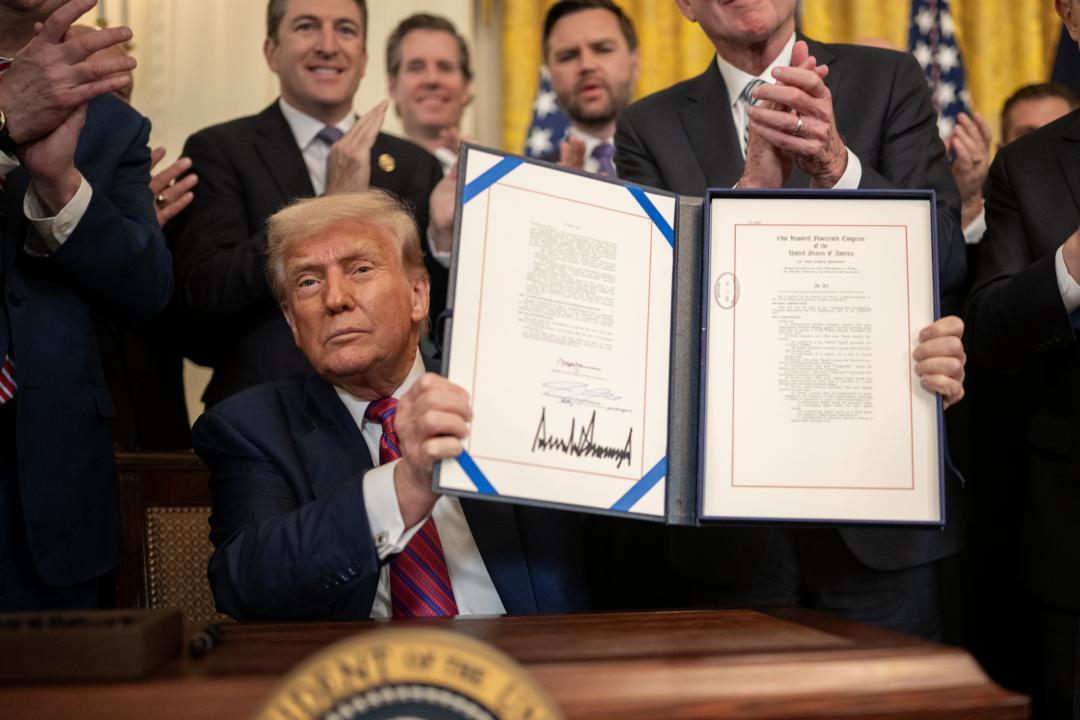
Trump Signs ‘GENIUS Act’ to Regulate Crypto, Jokes ‘They Named it After Me’
In a move aimed at regulating the rapidly growing cryptocurrency market, US President Donald Trump has signed the ‘GENIUS Act’ into law. The new legislation aims to regulate stablecoins, a type of cryptocurrency that is pegged to another asset like the US dollar. During the signing ceremony, Trump joked that the act was named after him, saying, “It’s a very important act, the GENIUS Act. They named it after me.”
The ‘GENIUS Act’ (Generating Economic Normative Interpretations Utilizing Stablecoins) allows banks, non-banks, and credit unions to issue their own stablecoins, which are designed to reduce the volatility associated with traditional cryptocurrencies like Bitcoin. Stablecoins are often used for transactions, and their value is pegged to a stable asset like the US dollar, making them more appealing to mainstream investors.
The signing of the GENIUS Act marks a significant step towards regulating the cryptocurrency market in the United States. While the act does not ban or restrict the use of cryptocurrencies, it aims to ensure that stablecoins are issued and traded in a responsible and transparent manner.
The GENIUS Act was introduced in the US Congress in June 2020, and it has been a subject of debate among lawmakers and industry experts. The bill’s sponsors, Senator Catherine Cortez Masto and Representative Darren Soto, have argued that the act will help to promote financial inclusion and innovation, while also protecting consumers and reducing the risk of financial instability.
Under the GENIUS Act, stablecoins will be subject to certain regulations and oversight, including requirements for anti-money laundering (AML) and know-your-customer (KYC) checks. The act also establishes a framework for the supervision and regulation of stablecoin issuers, which will be responsible for ensuring the stability and security of their coins.
The signing of the GENIUS Act has been welcomed by some in the cryptocurrency industry, who see it as a step towards greater mainstream acceptance of digital currencies. However, others have expressed concerns that the act may stifle innovation and limit the potential of cryptocurrencies to disrupt traditional financial systems.
In a statement, Senator Cortez Masto said, “The GENIUS Act is a critical step towards ensuring that stablecoins are issued and traded in a responsible and transparent manner. It will help to promote financial inclusion and innovation, while also protecting consumers and reducing the risk of financial instability.”
Representative Soto added, “The GENIUS Act is a major victory for the cryptocurrency industry, which has been growing rapidly over the past few years. It will help to promote the adoption of stablecoins and other digital currencies, while also ensuring that they are subject to robust regulations and oversight.”
The signing of the GENIUS Act is likely to have significant implications for the cryptocurrency market, particularly for stablecoin issuers and users. While the act does not ban or restrict the use of cryptocurrencies, it aims to ensure that stablecoins are issued and traded in a responsible and transparent manner.
In the coming months, it will be important to monitor the implementation of the GENIUS Act and its impact on the cryptocurrency market. As the act is rolled out, it will be essential to ensure that it strikes the right balance between promoting financial inclusion and innovation, while also protecting consumers and reducing the risk of financial instability.






